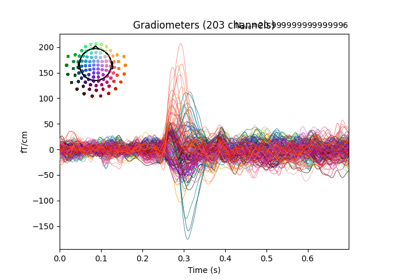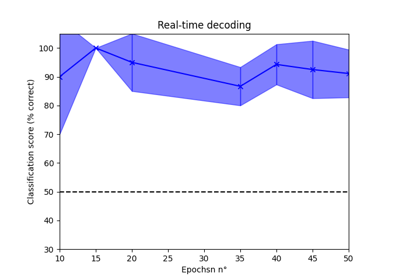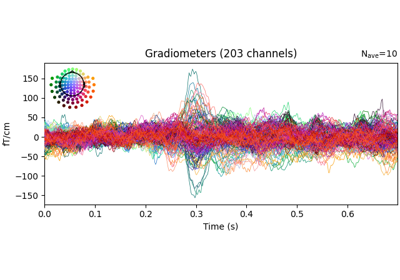mne_lsl.stream.EpochsStream🔗
- class mne_lsl.stream.EpochsStream(stream, bufsize, event_id, event_channels, event_stream=None, tmin=-0.2, tmax=0.5, baseline=(None, 0), picks=None, reject=None, flat=None, reject_tmin=None, reject_tmax=None, detrend=None)[source]🔗
Stream object representing a single real-time stream of epochs.
Note that a stream of epochs is necessarily connected to a regularly sampled stream of continuous data, from which epochs are extracted depending on an internal event channel or to an external event stream.
- Parameters:
- stream
Stream Stream object to connect to, from which the epochs are extracted. The stream must be regularly sampled.
- bufsize
int Number of epochs to keep in the buffer. The buffer size is defined by this number of epochs and by the duration of individual epochs, defined by the argument
tminandtmax.Note
For a new epoch to be added to the buffer, the epoch must be fully acquired, i.e. the last sample of the epoch must be received. Thus, an epoch is acquired at least
tmaxseconds after the event onset.- event_id
int|dict|None The ID of the events to consider from the event source. The event source can be a channel from the connected Stream or a separate event stream. In both case the event should be defined either as
intordict. If adictis provided, it should map event names to event IDs. For exampledict(auditory=1, visual=2).- event_channels
str|listofstr Channel(s) to monitor for incoming events. The event channel(s) must be part of the connected Stream or of the
event_streamif provided. See notes for details.- event_stream
Stream|None Source from which events should be retrieved. If provided, event channels in the connected
streamare ignored in favor of the event channels in this separateevent_stream. See notes for details.- tmin, tmax
float Start and end time of the epochs in seconds, relative to the time-locked event. The closest or matching samples corresponding to the start and end time are included. Defaults to
-0.2and0.5, respectively.- baseline
None|tupleof length 2 The time interval to consider as “baseline” when applying baseline correction. If
None, do not apply baseline correction. If a tuple(a, b), the interval is betweenaandb(in seconds), including the endpoints. IfaisNone, the beginning of the data is used; and ifbisNone, it is set to the end of the data. If(None, None), the entire time interval is used.Note
The baseline
(a, b)includes both endpoints, i.e. all timepointstsuch thata <= t <= b.Correction is applied to each epoch and channel individually in the following way:
Calculate the mean signal of the baseline period.
Subtract this mean from the entire epoch.
- picks
str| array_like |slice|None Channels to include. Slices and lists of integers will be interpreted as channel indices. In lists, channel type strings (e.g.,
['meg', 'eeg']) will pick channels of those types, channel name strings (e.g.,['MEG0111', 'MEG2623']will pick the given channels. Can also be the string values'all'to pick all channels, or'data'to pick data channels. None (default) will pick all channels.- reject
dict|None Reject epochs based on maximum peak-to-peak signal amplitude (PTP), i.e. the absolute difference between the lowest and the highest signal value. In each individual epoch, the PTP is calculated for every channel. If the PTP of any one channel exceeds the rejection threshold, the respective epoch will be dropped.
The dictionary keys correspond to the different channel types; valid keys can be any channel type present in the object.
Example:
reject = dict(grad=4000e-13, # unit: T / m (gradiometers) mag=4e-12, # unit: T (magnetometers) eeg=40e-6, # unit: V (EEG channels) eog=250e-6 # unit: V (EOG channels) )
Note
Since rejection is based on a signal difference calculated for each channel separately, applying baseline correction does not affect the rejection procedure, as the difference will be preserved.
Note
To constrain the time period used for estimation of signal quality, pass the
reject_tminandreject_tmaxparameters.If
rejectisNone(default), no rejection is performed.- flat
dict|None Reject epochs based on minimum peak-to-peak signal amplitude (PTP). Valid keys can be any channel type present in the object. The values are floats that set the minimum acceptable PTP. If the PTP is smaller than this threshold, the epoch will be dropped. If
Nonethen no rejection is performed based on flatness of the signal.Note
To constrain the time period used for estimation of signal quality, pass the
reject_tminandreject_tmaxparameters.- reject_tmin, reject_tmax
float|None Start and end of the time window used to reject epochs based on peak-to-peak (PTP) amplitudes as specified via
rejectandflat. The defaultNonecorresponds to the first and last time points of the epochs, respectively.Note
This parameter controls the time period used in conjunction with both,
rejectandflat.- detrend
int|str|None The type of detrending to use. Can be
'constant'or0for constant (DC) detrend,'linear'or1for linear detrend, orNonefor no detrending. Note that detrending is performed before baseline correction.
- stream
Attributes
Connection status of the
EpochsStream.Events of the epoched LSL stream.
Info of the epoched LSL stream.
Number of new epochs available in the buffer.
The time of each sample in the epochs.
Methods
acquire()Pull new epochs in the buffer.
connect([acquisition_delay])Start acquisition of epochs from the connected Stream.
Stop acquisition of epochs from the connected Stream.
get_data([n_epochs, picks, exclude])Retrieve the latest epochs from the buffer.
Notes
Since events can be provided from multiple source, the arguments
event_channels,event_sourceandevent_idmust work together to select which events should be considered.if
event_streamisNone, the events are extracted from channels within the connectedstream. Thisstreamis necessarily regularly sampled, thus the event channels must correspond to MNE'stim'channels, i.e. channels on whichmne.find_events()can be applied.if
event_streamis provided and is regularly sampled, the events are extracted from channels in theevent_stream. The event channels must correspond to MNE'stim'channels, i.e. channels on whichmne.find_events()can be applied.if
event_streamis provided and is irregularly sampled, the events are extracted from channels in theevent_stream.If
event_idisNone, the numerical value within the channels are ignored and the appearance of a new value in the stream is considered as a new event named after the channel name. This case can be useful when working with aPlayerreplaying annotations from a file as one-hot encoded events.If
event_idis provided, the events are selected based on the selected channels inevent_channelsand the providedevent_id.Note
In this case, the
EpochsStreamexpects a numerical event on only one channel at a time. In other words, the sample pushed to the event stream should have only one non-zero value at a time. If this is not the case, only the maximum sample value is considered as the event code.
Event streams irregularly sampled and using a
strdatatype are not supported.Note
In the last cases where
event_streamis provided, all'stim'channels in the connectedstreamare ignored.Read about the processing applied to the underlying buffer.
- acquire()[source]🔗
Pull new epochs in the buffer.
This method is used to manually acquire new epochs in the buffer. If used, it is up to the user to call this method at the desired frequency, else it might miss some of the events and associated epochs.
Notes
This method is not needed if the
mne_lsl.stream.EpochsStreamwas connected with an acquisition delay different from0. In this case, the acquisition is done automatically in a background thread.
- connect(acquisition_delay=0.001)[source]🔗
Start acquisition of epochs from the connected Stream.
- Parameters:
- acquisition_delay
float|None Delay in seconds between 2 updates at which the event stream is queried for new events, and thus at which the epochs are updated. If
None, the automatic acquisition in a background thread is disabled and the user must manually call the acquisition method :meth:~`mne_lsl.stream.EpochsStream.acquire` to pull new samples.Note
For a new epoch to be added to the buffer, the epoch must be fully acquired, i.e. the last sample of the epoch must be received. Thus, an epoch is acquired
tmaxseconds after the event onset.
- acquisition_delay
- Returns:
- epochs_streaminstance of
EpochsStream The
EpochsStreaminstance modified in-place.
- epochs_streaminstance of
- disconnect()[source]🔗
Stop acquisition of epochs from the connected Stream.
- Returns:
- epochsinstance of
EpochsStream The epochs instance modified in-place.
- epochsinstance of
- get_data(n_epochs=None, picks=None, exclude='bads')[source]🔗
Retrieve the latest epochs from the buffer.
- Parameters:
- n_epochs
int|None Number of epochs to retrieve from the buffer. If None, all epochs are returned.
- picks
str| array_like |slice|None Channels to include. Slices and lists of integers will be interpreted as channel indices. In lists, channel type strings (e.g.,
['meg', 'eeg']) will pick channels of those types, channel name strings (e.g.,['MEG0111', 'MEG2623']will pick the given channels. Can also be the string values'all'to pick all channels, or'data'to pick data channels. None (default) will pick all channels. Note that channels ininfo['bads']will be included if their names or indices are explicitly provided.- exclude
str|listofstr|tupleofstr Set of channels to exclude, only used when picking based on types (e.g.,
exclude="bads"whenpicks="meg") or when picking is set toNone.
- n_epochs
- Returns:
- data
arrayof shape (n_epochs, n_channels, n_samples) Data in the buffer.
- data
Notes
The number of newly available epochs stored in the property
n_new_epochsis reset at every function call, even if all channels were not selected with the argumentpicks.
- property connected🔗
Connection status of the
EpochsStream.- Type:
- property events🔗
Events of the epoched LSL stream.
Contrary to the events stored in
mne.Epochs.events, only the integer code of the event is stored in aEpochsStreamobject.- Type:
- property n_new_epochs🔗
Number of new epochs available in the buffer.
The number of new epochs is reset at every
Stream.get_datacall.- Type:
- property times🔗
The time of each sample in the epochs.
- Type:


